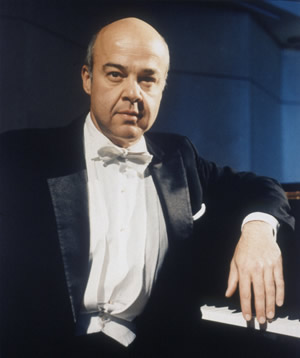The beautiful Recital Hall of the UNC Greensboro School of Music (an ideal space to hear music) was antarctically-air-conditioned, and hosted a full house for an exceptional chamber music program presented by the Eastern Music Festival. The curtain-raiser (missed by not a few, since the concert started with Britannic punctuality) was a brief rarity by Shostakovich, the Concertino for two pianos in A minor, Op. 94, written for his son Maxim to play at the Moscow Conservatory; a view of the “public” face of the composer, with his characteristic circus-like passages, sparkling in the hands of pianists Alexander Toradze and George Vatchnadze.
Next came the well-known Sonata for viola and piano, Op. 147, perhaps more than usually celebrated since it was Shostakovich’s final work, and a more-than-usually difficult work to take in since it uses few if any of the usual topics beloved to the composer. It features a high level of abstraction and it resembles other late Shostakovich in combining length (35 minutes or so) with predominantly slow motion (e.g. the final string quartet, with six movements marked adagio or adagio molto). That is to say, the listener has little to grasp in trying to follow the musical narrative. The young violist Mara Gearman demonstrated a complete mastery of her instrument, with a particularly sumptuous and rich tone in the viola’s lowest register, and, together with her accompanist Toradze, made the best possible case for a dark, complex work, arriving at a still, still conclusion, a hard-won major triad, with Gearman holding the silence with her bow long after the last resonances had vanished.
Following intermission there was another rarity, the Elgar Piano Quintet in A minor, Op. 84, another dark, difficult work, although one far from modernity. Although the piece belongs to England, and 1919, no modern listener would ever make those connections since the work has nothing to point to either from the British Isles nor the twentieth century. It has an aura of Brahms or late German Romanticism, circa 1880 (imagine, listeners, that this work is virtually contemporary with the Prokofiev 3rd Piano Concerto heard two nights before at the EMF – it seems impossible). Once the first movement gets truly underway (after a liturgical opening) the affect is that of Dvořák, or the music of the Romany. Elgar’s development calls for immense piano chords that recalled organ sonorities in the hands of pianist William Wolfram, who was joined by violinists Shawn Weil and Jenny Gregoire, violist Daniel Reinker, and cellist David LeDoux. The second movement has a particularly elegiac character, not unusual in English music, indeed, but here it seemed to belong to an English world that is hard to take seriously, the England that imperiously believed in its international civilizing mission, without a hint of either the self-mocking humor of Wodehouse or Monty Python, or of the refreshing influences of the folk music of Britain, an England that no longer exists, if it ever did. And yet, the music arguably has more air than similar German romanticism. It was beautifully played, on the very highest level, by the quintet of Festival musicians, who I imagine had not played together prior to this festival. A very fine performance.











